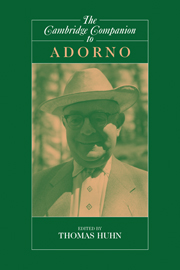Book contents
- Frontmatter
- Introduction: Thoughts beside Themselves
- 1 Negative Dialectic as Fate
- 2 Weighty Objects
- 3 Adorno, Marx, Materialism
- 4 Leaving Home
- 5 Is Experience Still in Crisis? Reflections on a Frankfurt School Lament
- 6 Mephistopheles in Hollywood
- 7 Right Listening and a New Type of Human Being
- 8 Authenticity and Failure in Adorno’s Aesthetics of Music
- 9 Dissonant Works and the Listening Public
- 10 Adorno, Heidegger, and the Meaning of Music
- 11 The Critical Theory of Society as Reflexive Sociology
- 12 Genealogy and Critique
- 13 Adorno’s Negative Moral Philosophy
- 14 Adorno’s Social Lyric, and Literary Criticism Today
- 15 Adorno’s Tom Sawyer Opera Singspiel
- Select Bibliography
- Index
2 - Weighty Objects
On Adorno’s Kant-Freud Interpretation
Published online by Cambridge University Press: 28 May 2006
- Frontmatter
- Introduction: Thoughts beside Themselves
- 1 Negative Dialectic as Fate
- 2 Weighty Objects
- 3 Adorno, Marx, Materialism
- 4 Leaving Home
- 5 Is Experience Still in Crisis? Reflections on a Frankfurt School Lament
- 6 Mephistopheles in Hollywood
- 7 Right Listening and a New Type of Human Being
- 8 Authenticity and Failure in Adorno’s Aesthetics of Music
- 9 Dissonant Works and the Listening Public
- 10 Adorno, Heidegger, and the Meaning of Music
- 11 The Critical Theory of Society as Reflexive Sociology
- 12 Genealogy and Critique
- 13 Adorno’s Negative Moral Philosophy
- 14 Adorno’s Social Lyric, and Literary Criticism Today
- 15 Adorno’s Tom Sawyer Opera Singspiel
- Select Bibliography
- Index
Summary
Adorno was vehemently anti-Hegelian. He was also one of the most thoroughly Hegelian thinkers of the century. He was anti-Hegelian insofar as he opposed final closure - reconciliation or Aufhebung - in philosophical inquiry. His opposition was based on combined theoretical and anthropological considerations concerning what might be called the anthropogenesis of the concept. Adorno believed that conceptual thinking arose out of the need for adaptation - for mastering inner and outer nature - and because of that always carried the seeds of domination within it. As Western rationality developed from its inception in pre-Socratic philosophy through the creation of modern science and technology, that potential in fact became realized on a global scale. With Hegel's system, Adorno argued domination in the material sphere was reflected by domination in the conceptual sphere. The totalitarianism of the system - where the whole swallows up the parts - was the counterpart of the overt totalitarianism of fascism and the velvet-gloved totalitarianism of the culture industry. For this reason, Adorno rejected the Hegelian system - and systematizing thought in general - as well as any impulse toward a final synthesis, and he asserted the right of the nonidentical against them.
- Type
- Chapter
- Information
- The Cambridge Companion to Adorno , pp. 51 - 78Publisher: Cambridge University PressPrint publication year: 2004
- 6
- Cited by

